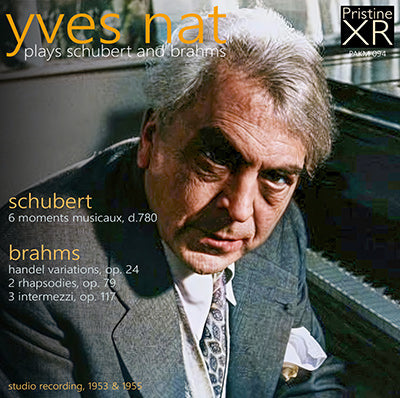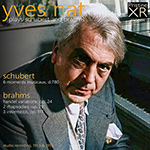
This album is included in the following sets:
This set contains the following albums:
- Producer's Note
- Full Track Listing
- Cover Art
Yves Nat (1890-1956) was a distinguished French pianist whose artistry left an indelible mark on the world of classical music. While he may not be as widely recognized as some of his contemporaries, his interpretations of the works of composers like Brahms and Schubert, among others, reveal a profound musical intellect and a remarkable command of the instrument.
Nat's playing was characterized by a combination of technical mastery, intellectual depth, and emotional sincerity. He possessed a formidable technique that allowed him to navigate the most challenging passages with ease, but he never used his virtuosity for mere display. Instead, he employed it as a means of conveying the composer's intentions with clarity and conviction. His interpretations were marked by a keen attention to detail, a deep understanding of musical structure, and a profound sensitivity to the emotional nuances of the music.
Nat's affinity for the music of Brahms is particularly noteworthy. His approach to Brahms was characterized by a sense of grandeur and nobility, capturing the composer's characteristic blend of passion and introspection. He possessed the technical and intellectual resources to fully realize the complex textures and intricate counterpoint of Brahms's music, while also conveying the underlying emotional intensity.
One of Nat's most celebrated recordings is his rendition of Brahms's Variations and Fugue on a Theme by Handel, Op. 24. In this work, Nat's technical prowess and intellectual grasp are on full display. He navigates the intricate variations with remarkable clarity, highlighting the unique character of each one while maintaining a cohesive sense of the whole. His performance of the fugue is equally impressive, demonstrating his mastery of counterpoint and his ability to build a musical argument with compelling logic.
In addition to his Brahms interpretations, Nat was also a highly regarded interpreter of Schubert. His approach to Schubert was marked by a similar combination of technical mastery and emotional depth. He captured the lyrical beauty and melodic charm of Schubert's music, while also conveying the underlying sense of melancholy and longing that permeates many of his works.
Nat's recordings of Schubert's Moments musicaux are particularly noteworthy. In these works, Nat's sensitivity to the nuances of Schubert's style is evident. He brings out the delicate interplay of light and shadow in the music, capturing the composer's unique blend of intimacy and grandeur. His playing is characterized by a warm and expressive tone, and he imbues the music with a sense of poetry and heartfelt emotion.
Despite his stature as a pianist, Nat's name may not be as widely recognized today as some of his contemporaries. This may be due in part to the fact that he was not a flamboyant or outwardly charismatic performer. His playing was characterized by a sense of restraint and understatement, and he let the music speak for itself. However, those who have taken the time to explore Nat's recordings have discovered a pianist of exceptional depth and artistry. His interpretations of Brahms and Schubert, in particular, stand as testaments to his profound musical understanding and his remarkable command of the instrument.
Despite his mastery of Romantic repertoire, Yves Nat never sought the kind of flamboyant, high-profile career that many of his contemporaries pursued. In 1934, at the height of his performing career, he largely withdrew from the concert stage to devote himself to teaching at the Paris Conservatoire. He would not return to public performance until the 1950s, when he embarked on a series of recordings that would cement his legacy as one of the great pianists of his generation. His approach to recording was meticulous, favouring single-take performances that preserved the spontaneity of live playing.
Yves Nat was a pianist of exceptional talent and artistry. His interpretations of the works of composers like Brahms and Schubert reveal a deep musical intellect, a formidable technique, and a profound sensitivity to the emotional nuances of the music. While he may not be as widely known as some of his contemporaries, his recordings remain a testament to his enduring contribution to the world of classical music.
YVES NAT plays Schubert and Brahms
SCHUBERT Moments musicaux, D.780
1. 1. Moderato (4:42)
2. 2. Andantino (6:13)
3. 3. Allegro moderato (1:42)
4. 4. Moderato (4:08)
5. 5. Allegro vivace (1:27)
6. 6. Allegretto (7:13)
7. BRAHMS Variations and Fugue on a Theme by Handel, Op. 24 (23:24)
BRAHMS Two Rhapsodies, Op. 79
8. 1. Agitato (6:31)
9. 2. Molto passionato, ma non troppo allegro (5:54)
BRAHMS Three Intermezzi, Op. 117
10. 1. Andante moderato (3:59)
11. 2. Andante non troppo e con molto espressione (3:37)
12. 3. Andante con moto (5:09
Yves Nat, piano
XR remastering by Andrew Rose
Cover artwork based on a photograph of Yves Nat
Schubert: recorded 1953
Brahms: recorded October 1955, Salle Aydar, Paris
Original recordings by Les Discophiles Francais
Total duration: 73:59

